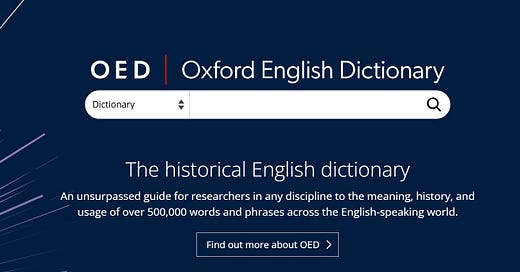The history of words is the history of humans. Suppose the English seventeenth century was wiped from the historical record. Elizabeth I reigns until 1603, then a blank spot. We know nothing of a parliamentary rebellion, the scientific revolution or the rise of capitalism. But there are clues. Words we use every day in the 2020s surfaced in the English language during this period. They are artefacts, witnesses to early modernity.
Legislature, newspaper, reform, human rights. Decapitate.
Data, environment, computer, chemistry, microscope.
Manufacture, monetary. Tea, chocolate.
In language ‘the past history of humanity is spread out in an imperishable map, just as the history of the mineral earth lies embedded in the layers of its outer crust’, Owen Barfield wrote in History in English Words, first published a century ago. Language, he said, holds ‘the living history of man’s soul’ and ‘the evolution of consciousness’.[1]
Historians of Britain are lucky to have the best map of the linguistic past ever made, these days entirely online, searchable, sortable and fascinating. When members of the London Philological Society launched what would become the Oxford English Dictionary in the mid-1800s they called it A New English Dictionary on Historical Principles. The idea was not just to give definitions but to track language across the centuries, ‘catch every word on its first appearance in our literature’ and then show extinctions, survivals and changing meanings.[2]
The OED must be the longest-running crowdsourced project and the biggest before the Internet. Organisers sought to harness ‘the scattered learning and energy which exists plentifully enough in this country’ by asking the public to contribute lexicographical nuggets. The OED’s early offices included a shed with 1,029 pigeonholes for organising millions of submission slips. Editors are still seeking help. The number of contributors over the years must run to many tens of thousands. Words followed through time show the history of culture, politics, immigration, war, love and how people see the world. Toile and toilet, from the French, tell about English textiles, the Scots-French Auld Alliance and the Victorian inability to talk about certain body functions. The journey of the word science, starting in the 1400s when it meant God’s omniscient awareness, shows the progress of knowledge.
Oxford English Dictionary website homepage, https://www.oed.com/
Thug is a Hindi word originally meaning a violent bandit. It came to be a colonial and modern disparagement of anybody you don’t like. Salvation marks the French monastic invasion of England in the 1100s and 1200s and the preaching friars adding French words to their sermons. French Huguenots fleeing to England were the first refugees by that name. The OED is essential to fiction writers building past worlds. ‘No one should even consider writing a historical novel without it there on the desk’, Philip Pullman wrote in The Guardian of the OED’s companion, the Historical Thesaurus of the Oxford English Dictionary.
The online OED, finicky a few years ago, has become really good. Editors cut the price of an individual annual subscription to $100 or £100, but in many places you can use public library subscriptions for free. Say, for some reason, you want to identify nouns joining English from Dravidian languages in the seventeenth century. OED advanced search delivers pariah, catamaran and two dozen others. All new words related to sport and leisure appearing in the 1200s? Wicket, bat, bookmaker… Adverbs used by Shakespeare related to agriculture? Parkward and afield. OED editors are casting further, drawing more fully on the University of Michigan’s Middle English Dictionary and other specialty research that often shows earlier examples of certain terms than those in the OED. Scholars still need to beware of the common mistake of saying a word ‘entered English’ at the time of its first OED citation. Preservation in a text is not the same as spoken usage, especially in the post-Conquest centuries when English was seldom written down while the language added thousands of Norman-French words.
Last year in Past & Present, a top social history journal, John Gallagher and Purba Hossain wrote that ‘language remains relatively marginal as a subject of historical analysis’.[3] Machine learning, the digital history movement and the OED’s trove of 600,000 word entries might change that.
The dictionary’s application programming interface enables specialised projects and access to bulk OED data. The Living with Machines team of historians, archivists and technologists is using the OED API to tune a language model with the aim of analysing how people talked and wrote about mechanisation during the Industrial Revolution. Like everybody OED editors must figure out how to coexist with AI bots and language datasets.
Creating today’s OED took a century of harvesting words by hand at the Bodleian, the British Museum and hundreds of other places. ChatGPT, Claude and the others can extract lexicographical information in an instant from Project Gutenberg and other enormous text repositories. But often they struggle at extracting meaning.
The OED has been working with the Google Books dataset and Google’s nGram Viewer to show historical changes in how often certain words are used. Expect more collaboration like this. Bots trolling language oceans can generate amazing results, but their sources and methods are often unknowable. The OED gives verifiable facts, the material of history.
Jay Hancock writes about history and society. He was the diplomatic correspondent and the economics correspondent for The Baltimore Sun. His articles have appeared in The New York Times, The Washington Post and elsewhere. In 2020 he was a finalist for the Pulitzer Prize in investigative journalism. His free Substack is here. He can be contacted on jayhancock@protonmail.com.
References and Resources:
Oxford English Dictionary,
https://www.oed.com/
O. Barfield, History in English Words (1967)
The Philological Society, Proposal for the Publication of a New English Dictionary (1859) https://babel.hathitrust.org/cgi/pt?id=mdp.39015011001495&seq=5
Christmas books | Best books of 2009 | The Guardian, https://www.theguardian.com/books/2009/nov/28/christmas-book-choice-review
J. Gallagher, P. Hossain, “Languages of History, Histories of Language,” Past & Present, Vol. 261, No. 1 (Nov. 2023) 32-60.
Middle English Compendium, https://quod.lib.umich.edu/m/middle-english-dictionary/dictionary
Living With Machines,
https://livingwithmachines.ac.uk/
[1] O. Barfield, History in English Words, (1967) 5-6.
[2] The Philological Society, Proposal for the Publication of a New English Dictionary (1859) https://babel.hathitrust.org/cgi/pt?id=mdp.39015011001495&seq=5
[3] J. Gallagher, P. Hossain, “Languages of History, Histories of Language,” Past & Present, Vol. 261, No. 1 (Nov. 2023) 32-60.






Fascinating update, thanks for the info and the links. I’ve actually recommended Google Books to fellow researchers as a means of checking historical vocabulary usage - not definitive but definitely indicative. I assume that there is no known fixed interval establishing usage in speech before a word is captured in text?